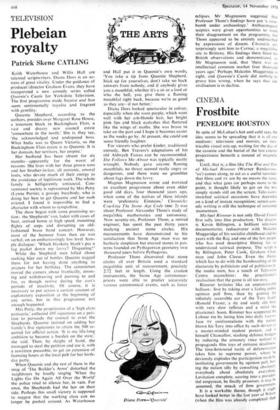TELEVISION
Plebeian royalty
Patrick Skene CATLING
Keith Waterhouse and Willis Hall are talented scriptwriters. Diana Dors is an ac- tress of great vitality. Under the guidance of producer! director Graham Evans, they have inaugurated a new comedy series called
Queenie's Castle for Yorkshire Television. The first programme made Steptoe and Son seem sentimentally royalist and fragrant with gentility.
Queenie Shepherd, according to the authors, presides over Margaret Rose House, a tenement block in Buckingham Flats, a vast and dreary new council estate 'somewhere in the north.' She is, they say, 'the acknowledged and undisputed boss. What India was to Queen Victoria, so the Buckingham Flats estate is to Queenie. It is her domain, her territory, her empire.'
Her husband has been absent for six months—apparently for the worst of reasons. She lives with her three grown sons and her brother-in-law, all moronic, amoral louts, who devote much of their energy to the avoidance of legitimate work. The whole family is belligerently -antisocial. Con- ventional society is represented by Mrs Petty (Lynne Perrie), a gossipy busybody, who is doing her best to get Queenie and her mob evicted. I found it impossible to find a character with whom to sympathise.
The show began with some promising ac- tion: the Shepherds' van, laden with cases of beer, arrived home at high speed, mounting flights of steps and disrupting an old- fashioned brass band concert. However, most of the humour from then on was verbal, on an embarrassingly low level. Sam- ple dialogue: 'Which blankety blank's put a fag packet down my lavvy? Disgusting!'
While the Shepherd men lolled about sucking beer out of bottles, Queenie nagged them for not having done anything to prepare for her birthday. The cameraman moved the camera about frantically, zoom- ing and withdrawing and panning to and fro, as though restive during the cast's periods of inactivity. Of course, it is necessary to put across a certain amount of explanatory exposition at the beginning of any series, but in this programme not enough happened.
Mrs Petty, the proprietress of a 'high class patisserie,' collected 495 signatures on a peti- tion to persuade the' council to evict the Shepherds. Queenie insisted on adding her family's five signatures to attain the 500 re- quired for official action. 'It is my life-long ambition to become a burden on the state,' she said. Then, by sleight of hand, she managed to steal the petition and use it, with a rewritten preamble, to get an extension of licensing hours at the local pub for her birth- day party.
When Queenie and the rest of them in the snug of 'The Builder's Arms' disturbed the neighbours by loudly singing 'When the Lights Go On Again All Over the World' the police tried to silence her, in vain. For once, the Shepherds had the law on their side. Perhaps this small victory is supposed to suggest that the working class can no longer be pushed around. As Waterhouse and Hall put it in Queenie's own words, 'You take a tip from Queenie Shepherd. Stick up for yourselves, don't take no back answers from nobody, and if anybody gives you a mouthful, whether it's a sir or a lord or who the hell, you give them a flaming mouthful right back, because we're as good as they are—if not better.'
Diana Dors looked spectacular in colour, especially when she wore purple, which went well with her ash-blonde hair, her bright pink lips and black eyelashes that fluttered like the wings of moths. She was brave to take on the part-and I hope it becomes easier as the weeks go by. At present, she could use some friendly laughter.
For viewers who prefer kinder, traditional comedy, Ben Travers's adaptations of his old Aldwych Farces can be recommended. She Follows Me About was typically neatly wrought. Nobody gave anyone flaming mouthfuls, no threat seemed really angry or dangerous, and there were no grumbles about fags down the lavvy.
Magnus Magnusson wrote and narrated an excellent programme about even older good old days, four thousand years ago, when some of the natives of these islands were 'prehistoric Einsteins.' Chronicle: Cracking The Stone Age Code (Bac 2) was about Professor Alexander Thom's study of megalithic mathematics and astronomy. Now seventy-six, Professor Thom, a retired engineer, has spent the past thirty years studying ancient stone circles. His measurements have demonstrated to his satisfaction that Stone Age man was no barbaric simpleton but erected stones in pat- terns founded on Pythagorean geometry two thousand years before Pythagoras.
Professor Thom discovered that stone circles all over Britain used a standard megalithic unit of measurement, precisely 2.72 feet in length. Using the crudest instruments, the Stone Age astronomer- priests were able to predict accurately various astronomical events, such as lunar Diana Dor!r—'Queenie'
eclipses. Mr Magnusson suggested that Professor Thom's findings have put 'a time. bomb under archaeology.' Archaeological sceptics were given opportunities to voice their disagreement on the programme, but Thom appeared to be entirely undisturbed by expressions of dissent. Chronicle en- terprisingly sent him to Carnac, a megalithic site in Brittany. His findings there fitted his British observations and demonstrated, as Mr Magnusson said, that 'there was an intellectual common market four thousand years ago.' Perhaps Malcolm Muggeridge right, and Queenie's Castle did nothing to prove him wrong, when he says that our civilisation is in decline.








































 Previous page
Previous page